Democratic Republic Of Congo
Martin Fayulu, the leader of an opposition coalition in Democratic Republic of Congo’s presidential election, faced a second day of clashes with the authorities as he sought to hold a rally in the Eastern part of the country.
Sources told AFP news agency that three people were killed on Wednesday in clashes with police in Kalemie, a town on Lake Tanganyika, where Fayulu was scheduled to campaign.
It came a day after two of Fayulu’s supporters were killed and 43 hurt in clashes at a rally in Lubumbashi, the Democratic Republic of Congo’s second-largest city.
Two witnesses said “live rounds” were fired after the opposition candidate arrived in Kalemie and headed to the venue.
Fayulu blamed the violence on police as well as on “armed youths on drugs” who, he said, were “dressed in PPRD clothing,” a reference to the country’s ruling party.
“I saw people shooting and I saw a lady fall in front of me,” he told AFP.
He added: “Despite everything, we reached the venue for the rally, we held the rally.”
Fayulu’s aides said three people were killed. A local doctor told AFP there were three bodies at the hospital morgue, while an emergency responder said his team had picked up four bodies.
Fayulu, 62, a little-known lawmaker and former oil executive, has made a late surge after being named the joint candidate for several opposition parties.
As well as Fayulu, the front-runners are Felix Tshisekedi of the mainstream opposition Union for Democracy and Social Progress and Emmanuel Ramazani Shadary, Kabila’s handpicked successor.
ALSO READ: Background to DR Congo’s delayed 2018 presidential pollsLubumbashi rally
The violence on Tuesday in Lubumbashi came as Fayulu sought to attend a rally there.
A civil rights group, the Congolese Association for Access to Justice (ACAJ) said two people were killed and 43 hurt, 15 with gunshot wounds, according to a provisional toll. The police said 11 police and two civilians were injured. It did not mention any fatalities.
Fayulu said on Tuesday he had been prevented by police from reaching the rally in Lubumbashi.
On Wednesday, he said the authorities had blocked him from flying from Kalemie to the next stop on his schedule, the southern mining city of Kolwezi.
“I am in Goma. They diverted us. They told us that we have no other choice, either Kinshasa, Goma or Bukavu,” he said, referring to a phone conversation with the powerful National Intelligence Agency (ANR).
The UN’s special envoy for the DRC, Leila Zerrougui, issued a statement deploring lives lost in pre-election violence and called on the government to “take the necessary steps to avoid new incidents.”
Election equipment delivered
In a separate development Wednesday, the DRC’s election commission said it had completed the deployment of voting equipment and tested it.
In a posting on Twitter, the Independent National Election Commission (CENI) said that, despite “difficulties,” it could “reassure (the public) that all the election equipment has arrived across the country and in towns and, after technical verification, is in a good operational status.”
The technical and logistical side of the vote has become a fierce political issue.
Some opposition parties are contesting the use of Korean-made electronic voting machines, saying the touchscreen devices can be hacked or the results manipulated.
CENI argued in return that the machines, which also provide a printout to the voter, were completely secure and the only way to quickly tally results across the DRC, a country four times the size of France but hobbled by poor infrastructure.
ALSO READ: DRC govt supplies poll logistics: lorries, planes and helicopters




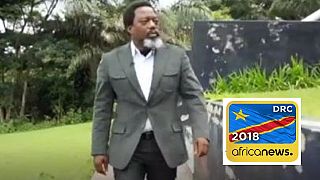
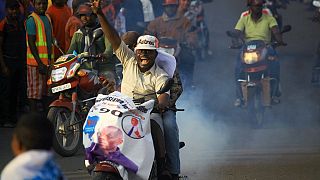
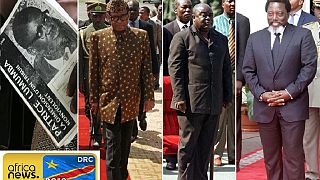
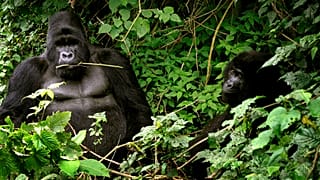
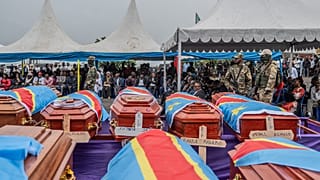
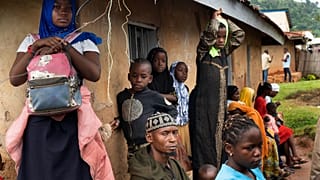
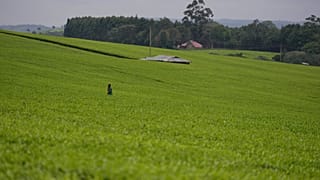
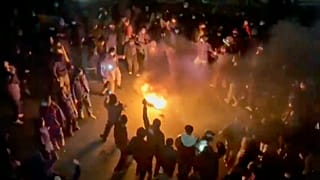
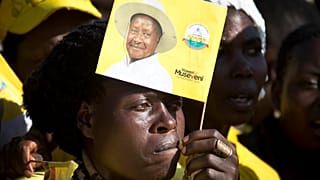
01:43
Kampala decked in colours of Ugandan president's party ahead of polls
01:52
Ahead of election, Uganda's security forces are accused of using violence
01:36
DRC: Funeral held for victims of drone strike blamed on govt forces
01:44
Runner-up in CAR's presidential election rejects provisional results, alleging widespread fraud
01:25
Guinea: Claude Pivi, ex-security chief convicted over 2009 stadium massacre, dies
00:56
Algeria reach AFCON quarterfinal after dramatic win over DRC